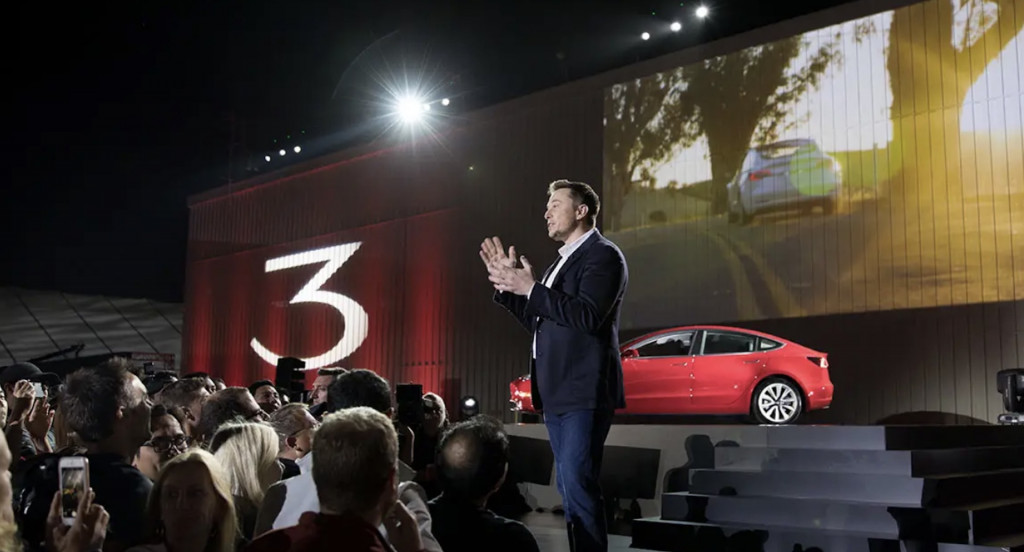Which automaker managed to turn a profit, without ever making a model with an internal-combustion engine?
And which automaker asked specifically for a national electric-vehicle mandate?
This is Green Car Reports’ look back at the Week in Reverse, for the week ending October 26, 2018.

Chevrolet Bolt EV electric car with future GM electric and hydrogen fuel-cell vehicles, Oct 2017
We ended the week with an unexpected policy push from a major automaker. On what the final day of an extended deadline for public comment to the EPA—which recently dissolved two panels of scientific advisors—General Motors asked the Trump administration to consider a national vehicle mandate with credits and targets much like California’s program.
Earlier in the week we reported that GM will hit the 200,000-vehicle ceiling for the federal EV tax credit this quarter, for a phaseout that will reduce credit amounts starting in April.

Elon Musk at Tesla Model 3 reveal
Tesla news seemed to hit another fever pitch this week, as the automaker reported a profit—in a way, serving as Elon Musk’s redemption for a rocky past few months. Further, Tesla gave a little more of an explanation about how and why the Model 3 Mid Range, which was suddenly raised $1,000 versus last week’s price, joined the lineup. Pricing aside, we looked at one of several market strengths Tesla has: its ability to squeeze more miles out of each kwh than most other EV makers.
With all that good news, there were some bumps in the road for Tesla as well. At the end of the week we reported that federal investigators may still be looking into whether Musk knowingly lied about the Model 3 production ramp-up. The Model S fell off Consumer Reports’ recommended list yet again. And earlier in the week we examined some of the missed opportunities claimed by a Model 3 teardown from earlier this year; it sounds like the automaker has already learned from some of them.

Volvo invests in Freewire
In news outside of Tesla and GM, the vacuum-cleaner maker Dyson also hopes to start making an electric car in 2021. Early this week it announced Singapore as the global manufacturing site for it. Volvo invested in the mobile-charging company Freewire. And BMW underscored that the market won’t suddenly go all battery-electric; 85 percent of its new vehicles will still have an internal combustion engine in 2030. And we'll bet not one of them will yet have a "mass-less" battery that's part of the body.
And footprint matters. Electric vehicles reduce your emissions footprint almost everywhere; but a report concluded that because of where battery packs are made, they could offset several years of those advantages. At the start of the week we reported about a reduced-cost, smaller-footprint (curb space, that is) DC fast-charger design, then, later in the week, a new design for wireless charging, claiming some impressive efficiency numbers.
Our poll, also about Tesla, was...amusing...and it gave us some insight on who you think should be Musk’s voice of reason in leading the company’s board. And be sure to vote on how far ahead you see an all-electric future in this week’s poll.













